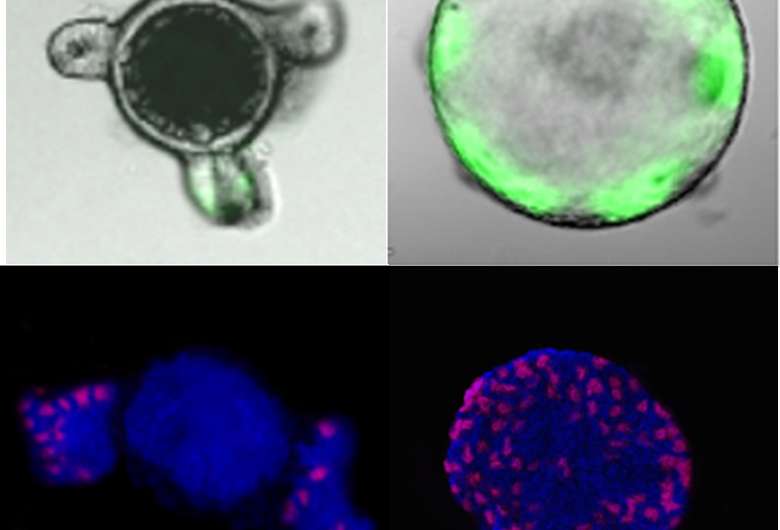How gut inflammation sparks colon cancer

Chronic inflammation in the gut increases the risk of colon cancer by as much as 500 percent, and now Duke University researchers think they know why.
Their new study points to a biomarker in the cellular machinery that could not only serve as an early warning of colon cancer, but potentially be harnessed to counteract advanced forms of the disease, the second-largest cause of cancer death in the U.S.
In the study, published online on February 4 in the journal Cell Stem Cell, Duke biomedical engineers show how colon cancer development is intricately linked to a specific microRNA that dictates how cells divide.
"A quarter of the world's population is affected by some type of gut inflammation," said lead author Xiling Shen, associate professor of biomedical engineering at Duke University. "These patients always have a much higher chance of developing colon cancer, but it was never clear why. Now we have found a link."
In the study, Shen's group focused on a microRNA called miR-34a that gives cancer stem cells the odd ability to divide asymmetrically. This process controls the cancerous stem cell population and generates a diverse set of cells.
While researchers knew that miR-34a was responsible for this ability, nobody knew where it came from, because normal, healthy colon stem cells don't asymmetrically divide and don't need this microRNA. They wondered if there was a mutation unique to cancer stem cells, or a hidden role for the microRNA in normal physiology.
To find out, Shen and his colleagues deleted miR-34a from the genetic code of some mice. But nothing happened.
"It really puzzled the scientific community," said Shen. "Usually if something is important and you delete it, it causes a problem."
In the latest study, however, the problem showed up when the mice's tissues became inflamed. Without any microRNA miR-34a, their stem cells quickly grew out of control and formed many tumor-like structures.
Based on the study, Shen's group concluded that even though miR-34a is active in cancer, it's actually a good guy. Triggered to act when the gut becomes inflamed, miR-34a forces the process of asymmetrical division, helping to control normal stem cell populations.
Even in the early stages of tumor growth, the microRNA remains active to keep the cancer stem cell population down. As the cancer progresses however, its cells develop mutations that enable shutting off miR-34a, causing cells to divide into flexible hybrids that can revert back into stem cells if needed. It's this flexibility that makes late-stage cancers so difficult to eradicate.
"Typically when you look at tumors and see something that isn't in normal tissue, you think it's a bad thing," said Shen. "But it turns out that, under normal circumstances, these microRNAs are the good guys who only show up when things go wrong. And when you silence them in late-stage cancer, it's like the supervillain carried off the superhero and the cancer becomes much worse."
But Shen is hoping that understanding the role of miR-34a might lead to this supervillain's vulnerability.
With a test to look for elevated levels of miR-34a, researchers could create an early warning system to catch cancers in their youthful stages when they are much easier to cure. And as a possible treatment for late-stage cancer, researchers are trying to get the cancer cells to express miR-34a again. This would stop the tumor cells from gaining the flexibility to revert back to stem cells and allow doctors to wipe them out once and for all.
Clinical trials are currently trying to do just this in multiple cancer types, but this is the first study that has shown that it might also work for colon cancer. The discovery will also help researchers design clinical trials and pick the patients who have the best chance to respond to the therapy.
More information: "A miR-34a-Numb feed-forward loop triggered by inflammation regulates asymmetric stem cell division in intestine and colon cancer." Pengcheng Bu, Lihua Wang, Kai-Yuan Chen, Tara Srinivasan, Preetish Kadur Lakshminarasimha Murthy, Kuei-Ling Tung, Anastasia Kristine Varanko, Huanhuan Joyce Chen, Yiwei Ai, Sarah King, Steven M. Lipkin, Xiling Shen. Cell Stem Cell, 2016. DOI: 10.1016/j.stem.2016.01.006
















